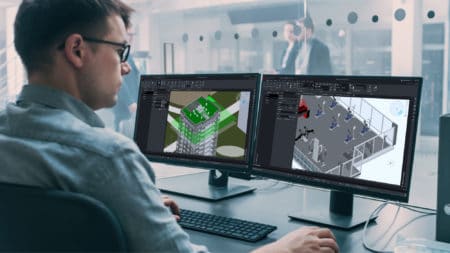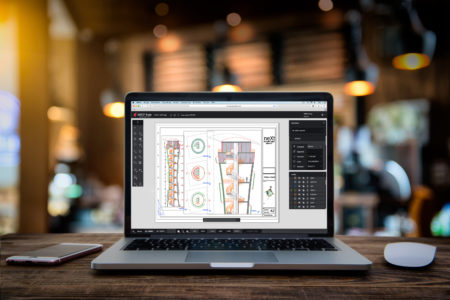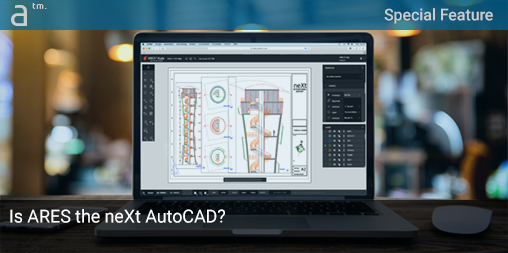IN THE AEC AND MANUFACTURING INDUSTRIES, enterprises small and large the world over are feeling the economic pressure to remain innovative and competitive. The truth is—it’s a big challenge.
Over the past half-decade, a constellation of inter-related emerging technologies has shown promising potential in both AEC and manufacturing. Now mix in the new technologies to optimize your workforce for the post-pandemic reality. The result? Enterprises need to conduct no-nonsense re-evaluations of their production systems from top to bottom.
The Economics of ARES Trinity
CAD-based enterprises can begin this process by challenging the assumptions behind their current systems. And it is Germany’s Graebert’s wish that firms using Autocad consider taking a no-nonsense view of the company’s ARES Trinity CAD platform.
Trinity is a product portfolio based on ARES’s native (.dwg) CAD technology. And it uniquely provides the broadest array of device and operating system coverage in the CAD industry.

ARES Trinity CAD technology offers the largest spectrum of support on operating systems and devices, from smartphones to workstations to enterprise versions of ARES Kudo running on Amazon AWS S3 servers.
ARES Commander is desktop CAD for Windows, macOS, and Linux computers. ARES Touch is made for smartphones and tablets running Android and Apple iOS. And ARES Kudo is a full-browser-based CAD system for creation, editing, and advanced collaboration. Customers do not need to acquire the entire Trinity of CAD solutions; they can cherry-pick what they need.
The entire Trinity collection of tools costs USD 299 per year under an annual subscription. A yearly subscription to Autocad is six times higher. Yet, the benefits of ARES Trinity don’t stop at a reduced cost for licensing the software. That’s where they begin.
Let’s briefly review where those benefits play out across the entire Trinity of CAD solutions, starting with ARES Commander.
ARES Commander—Unique Selling Points
ARES Commander is aimed at both manufacturing CAD and the AEC/O industry. In direct head-to-head competition with Autocad, the solution offers unique features focused on the AEC/O industry.
The CAD solution can ingest Revit and IFC BIM model files and rather quickly generate 2D CAD drawings in (.dwg) file format. ARES Commander is not meant to be a BIM solution in the traditional sense; instead, the CAD system is intended to leverage BIM models and their data for use in CAD drawings. Its BIM tools and BIM-oriented workflow differentiate it from Autocad considerably.

ARES Commander features BIM-forward features targeted at BIM workflow scenarios for multiple AEC/O project participants, not just architects and engineers. Professionals like general and sub-contractors, estimators, installers, and custom manufacturers can all benefit from ARES Commander’s ability to work with Revit and IFC BIM files, extracting the data and geometry from the BIM models useful for their purposes.
For those interested to learn more, this author encourages you to register for Graebert’s neXt Event coming this early April. The German CAD company will introduce its 2023 product line at that time.
ARES Touch—Unique Selling Points
ARES Touch works on Google Android and Apple iOS, and Apple iPadOS. Like Autocad mobile app, ARES Touch allows the user to edit, create, and view (.dwg) CAD drawings on the go.
Yet there are several unique features to ARES Touch. Only ARES Touch offers voice notes and stamps as a form of rapid annotation. ARES Touch also supports printing to PDF with printing options and exporting to PDF.
Like Autocad mobile app, ARES Touch can work both online and offline. Yet, ARES Touch has deeper collaboration features as ARES Trinity as a platform boasts true “session handling” to allow multiple users from saving over each other’s work and losing data. When one user is working with a (.dwg) file in any ARES product, that file for others will only be “view only” on their machines.

Japan’s famous “Toyota Way” management style systematically eliminates “wastes” in production processes, leaving Japanese companies in an enviable lean and competitive position with respect to global peers. Taisei Corporation has executed a formidable efficient connection between the construction site and design staff in the office using ARES Trinity CAD solutions and over 4,000 iPads in the field with ARES Touch.
ARES Trinity also features robust collaboration commenting features across the ARES portfolio. A user in the field on Touch (see, Architosh: “Japanese AEC Giant Selects Graebert ARES CAD Technologies—Learn Why,” 8 March 2022) can collaborate in real-time with another user in the office around a single CAD file and have an entire discussion in a thread with replies. The system also includes email notifications.
Autocad’s mobile version doesn’t support this feature, and its substitute features—like “Trace”—actually increase steps in the process compared to ARES Touch and the Trinity features.
ARES Kudo—Unique Selling Points
Kudo is ARES in the web browser. Like ARES Touch, it also has a range of PDF features not found in the Autocad web app. These include both Print to PDF and PDF Export. And we understand that there are more PDF features likely in store in the 2023 release next month.
ARES Kudo is also officially supported in more web browsers. Importantly for Mac users, ARES Kudo runs on Apple Safari and not just Chrome and Firefox. It also runs on Linux in popular browsers like Chrome and Firefox.

ARES Kudo shown running on a MacBook computer using the Apple Safari web browser, something that AutoCAD for Web does not support. ARES Kudo runs on Opera and other web browsers on Linux as well.
Graebert contends that ARES Kudo is faster than Autocad for web. While Architosh has not verified this, there are two reasons this may be true. Firstly, ARES Kudo has been used in production longer and is more mature. Secondly, a version of Kudo runs inside PTC Onshape, and demands of sophisticated mechanical drawings have likely driven its performance improvements.
ARES Kudo also supports 3D orbit controls for visualizing files in 3D. Autocad web only supports 3D viewports. And the latter lacks support for line weights.
Trinity Connectivity—Advantages
Both ARES Trinity and the Autodesk Autocad collection of apps have robust cloud connectivity. The advantages tip to ARES Trinity regarding enterprise cloud integration needs. And we have already written about Japanese giant Taisei Corporation and its OEM version of ARES CAD technologies and unique cloud and security needs.
ARES offers WebDAV protocol to connect to private servers and file management solutions like NextCloud, pCloud, and OwnCloud. And importantly, ARES offers cloud support on Trimble Connect and Onshape. So those in the AEC industry who rely on Trimble tools can integrate and store their (.dwg) CAD files inside Trimble Connect. Similarly, for Onshape for manufacturing CAD customers.
Finally, enterprise versions of ARES are available with customizations and deeper administration settings for large deployments. Some of the Enterprise features include support for MDM (Mobile Device Management) on Mobile Devices, Single Sign-On with Microsoft Active Federation Services, and the possibility to deploy ARES Kudo on private clouds such as dedicated Amazon AWS S3 infrastructure. Autocad doesn’t support any of those options.
Version Control
There is one more robust feature set that ARES Kudo has that Autocad fails to have. And that is version history. With Kudo, users can see who had been making changes to files, revert to earlier versions of those files, and upload another version to save as part of its history. This includes an Autocad user working on those files.
Advertisement
Looking at this comparison, it should be clear that ARES Trinity is a more industrial-strength, enterprise-grade (.dwg) native CAD platform, with true “session handling” for real-time, multiple user CAD drawing scenarios, and real-time robust collaboration features.
No-Nonsense Productivity
At the beginning of this article, I used the phrase “no-nonsense.” It comes from one of my favorite Harvard Business Review articles titled “No-Nonsense Guide to Measuring Productivity,” by Bruce Chew, former associate professor at Harvard and current managing director at Deloitte in Boston
Chew notes that the formula for measuring productivity is disarmingly simple. Productivity equals units of output divided by units of input.
He notes, “A company producing more with a given set of inputs (capital, labor, and materials) or using fewer inputs to produce the same output has an advantage over the company producing less.”

With true “session control,” ARES Trinity allows multiple users to access and work on (.dwg) CAD files from the full array of ARES solutions from the office, home office, job site, or any other location. This protects files from accidental data loss while also enabling high degrees of collaboration and joint-working.
Companies embracing ARES Trinity of CAD technologies—like Japanese AEC giant Taisei Corporation—are substituting CAD applications to reduce capital inputs while retaining or boosting overall outputs. The economics of this kind of technology shift makes more sense now in the current context of both emerging technologies and shifting remote work-life balance scenarios for enterprises post-Covid, as mentioned earlier.
Closing Thoughts
When it comes to capital inputs, the financial benefits of the ARES Trinity of CAD solutions should be obvious. But ARES and Autocad are not 1:1 solutions. There exist unique selling points on both sides of the equation.
However, when you look at ARES’s 1/6 cost ratio advantage, it means considering all other inputs equal, Autocad would need to help a firm produce vastly more output to make up for its higher cost.
Moreover, the savings obtained vis-a-vis ARES Trinity can be redeployed to help a firm address the pressures to remain innovative and competitive.
Learn More
To learn more about ARES Trinity, we recommend readers register for the Graebert neXt Event on 7 April 2022. The author of this article will be a participating speaker at this exciting CAD event. Be sure you don’t miss out by registering now, and if your schedule has a conflict, register and watch later on-demand.




Reader Comments
Comments for this story are closed